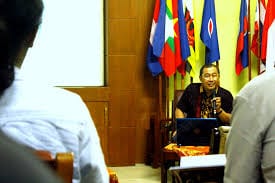
“Area studies programs were closed or merged into other units; on the eve of the September 11 attacks, half of the top political science departments in the United States did not have a Middle East studies program. ”
—
The above sentence was written by Francis Fukuyama quoted by Budiawan as the opening of the SEA-Talks # 5 on Tuesday afternoon (29/01/2016) in Center for Southeast Asian Social Studies (CESASS). It is a writing describing the recent fate of institutionalized regional studies in the United States. The view of the Crisis on the study of the area by Francis Fukuyama was also supported by the writings of Professor Robert Elson which stated that, 10 years ago, Asian Studies in Australia had a strong activity. But conditions have now declined, and it is believed that only Australia National University remains in this crisis.
Dr. Budiawan who is an alumni of the Southeast Asia Studies program from the National University of Singapore stated that the crisis experienced by the study area does not exclude the study of Southeast Asia region in it. He criticized the naming of Southeast Asia, which in its history was given by the people from outside the region . In some historical literature, it is stated that until the mid-19th century the name ‘Southeast Asia’ had not existed. It was not until the late 19th century, until the beginning of the 20th century, the name ‘Southeast Asia’ was present as a cultural connotation, that is the region in the south (south) of China and the east (east) of India. Until the 1930s, this name became more popular and widely used in some countries.
The name Southeast Asia then shifted from the original area of cultural connotation to a geo-political or geo-strategic connotation after the issuance of South-East Asia Command (SEAC) by the British in the Pacific war. The SEAC region extended from Ceylon (Sri-Lanka) to China-Indochina border including Hainan region, and western and central Indonesia. While the eastern part of the Philippines and the eastern part of Indonesia were not included because of American responsibilities.
After the second world war was over, the process of institutionalization of the Southeast Asian region as a field of study began . This was marked by the birth of the Southeast Asian study program at the University of London (1946), Yale University (1947), Cornell University (1950) and so on. The establishment of this Southeast Asian study was characterized by a connection between knowledge and power, which in the study of Southeast Asia was interpreted as a study in “perspective of the outsiders”, which was thick with modernist or developmentalist perfective nuances.
According to Dr. Budiawan, the above things have increasingly indicated that regional studies and orientalism is a project of post-colonial society modernization. Regional studies and orientalism are increasingly perceived to be drowning as a very nuanced Euro-america centric study. The emergence of poststructuralism which then inspired the birth of postcolonialism and gave a harsh critique of the views of Orientalism. This then more increased the crisis tension in the regional studies, because its epistemic side feels more minimal.
This is felt increasingly severe with the slow progress of institutional studies of Southeast Asia region in Southeast Asia itself. Although it began in 1955 at the University of Philippines, then the formation of the ISEAS (Instute of Southeast Asian Studies) in 1968, the Southeast Asia Studies was born at the University of Malaya in 1976, although the proposal was never thwarted in 1961, the study of this area is still lacking.
Only after the 1990s, Southeast Asia study in Southeast Asia showed institutional progress by establishing Southeast Asian Studies programs at undergraduate and post-graduate levels at several universities in Southeast Asian countries, such as; Universiti Sains Malaysia, National University of Singapore, Chulalongkorn University. This trend then continued in the 2000s, where Thammasat University, and several other universities in Vietnam and the Philippines began establishing courses for the Southeast Asian region. Then how is the condition in Indonesia?
Scientists then see there are several offers that can keep this study exist as a field of scholarship. Ariel Heryanto and K. Summit Mandal mentioned that the study of Southeast Asia should prioritize aspects of linkage and comparison. Charnvit Kasetsiri mentioned that this study should be seen as potential to be “mirrors of one another”. Or Goh Beng Lan which critically stated that this study should be a decentre and should diversify production plant of knowledge, or should be a different alternative and should not connected to western ideas. A recent view by Fadjar I. Thufail mentioned this study should put forward as a research strategy that has a topic that links one place to another by imagining how they are connected to form a network.
